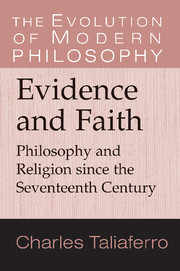Book contents
- Frontmatter
- Contents
- Acknowledgments
- Introduction
- 1 The Sovereignty of the Good in Seventeenth-Century Philosophy of Religion
- 2 Cartesian Philosophy of Religion
- 3 The Ascendancy of Rules of Evidence in Early Modern Philosophy of Religion
- 4 Humean Philosophy of Religion
- 5 Kantian Philosophy of Religion
- 6 Religion and the Philosophical Gods and Giants
- 7 Continental and Feminist Philosophy of Religion
- 8 Five Major Moves
- 9 Religions, Evidence, and Legitimacy
- Appendix A A Guide to Further Study
- Appendix B Select Contemporary Philosophers
- Select Bibliography
- Index
7 - Continental and Feminist Philosophy of Religion
Published online by Cambridge University Press: 15 December 2009
- Frontmatter
- Contents
- Acknowledgments
- Introduction
- 1 The Sovereignty of the Good in Seventeenth-Century Philosophy of Religion
- 2 Cartesian Philosophy of Religion
- 3 The Ascendancy of Rules of Evidence in Early Modern Philosophy of Religion
- 4 Humean Philosophy of Religion
- 5 Kantian Philosophy of Religion
- 6 Religion and the Philosophical Gods and Giants
- 7 Continental and Feminist Philosophy of Religion
- 8 Five Major Moves
- 9 Religions, Evidence, and Legitimacy
- Appendix A A Guide to Further Study
- Appendix B Select Contemporary Philosophers
- Select Bibliography
- Index
Summary
The wise man as astronomer: As long as you feel the stars to be “above” you, you do not gaze as one who has insight.
Friedrich NietzscheTwo Rivers
The category “continental philosopher” is the popular term for many of the figures covered in this chapter. In a way, the roots of continental philosophy stretch back to the rift described at the end of Chapter 5 between those thinkers who are loosely associated with the romantic movement and those associated with Kant. Intellectuals such as Jacobi rejected the Enlightenment dream of a critical philosophy founded on reason. Frederick Beiser effectively states the process of how an Enlightenment ideal devolved.
The context of German philosophy toward the close of the eighteenth century was dominated by one long-standing cultural crisis: the decline of the Aufklärung, the German Enlightenment. This crisis threw into question its main article of faith: the sovereignty of reason. The Aufklärung was the German “age of reason,” or, since reason was conceived as a critical power, “the age of criticism.” The Aufklärung gave reason complete sovereignty because it claimed that reason could criticize all of our beliefs, accepting or rejecting them strictly according to whether there is sufficient evidence for them … such was the bold programme – and dream – of the Aufklärung. Tragically, though, it carried the seeds of its own destruction. Simply to state its principle of the sovereignty of reason is to raise grave questions about it. For if reason must criticize everything on heaven and earth, must it not also criticize itself?[…]
- Type
- Chapter
- Information
- Evidence and FaithPhilosophy and Religion since the Seventeenth Century, pp. 291 - 336Publisher: Cambridge University PressPrint publication year: 2005

